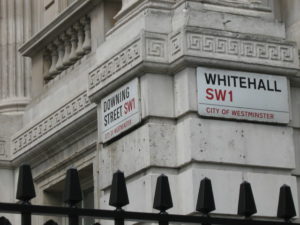The political lie that has taken hold so forcefully in the UK, as in the US, is that the state has become corrupted. Nostalgia for a ‘neutral’ civil service reining in the excesses of their supposed political overlords shouldn’t obscure the fact that many Whitehall departments have lost their historic sense of their mission in the public interest. The checks and balances once provided by both the civil service mandarins and by the media have atrophied. This is the culture that meant political chicanery won out over science in February and March. This is the culture that cost tens of thousands of lives.

Colin Crouch, in a recent piece for Compass assessing a government communications strategy based on the ‘promise, the boast [and] the slogan’, says one of two things may happen:
“As the immediate crisis recedes, will most people continue to believe in the boasts and forget the distortions and failures? If this happens at a time of such alert citizen consciousness, then the battle to restore serious mass political debate will have truly been lost. Politicians will be justified in teaching themselves a new three-word slogan: Carry on Manipulating! But if enough citizens demand in future to be treated like adults, then cleaner air and stronger neighbourhood bonds might not be the only goods that the extraordinarily ill wind of Covid-19 will have brought us.”
I am hopeful that it will be the latter – hopeful enough to have joined Compass to help this happen.
I am hopeful because the public mood is swinging against the government’s handling of the crisis, during which reality has caught up with the political lie. Previously, the government’s lie machine had been able to outpace the truth tellers, but the body count now is too big, too obvious.
I am hopeful because, as a population, we displayed a spontaneous agency that the political liars had started to think we no longer had the will to muster.
We saw the virus was amongst us, realised that we were being lied to, and started to do what was needed even before the government caught up and started to try and spin its new web of deceit about how this had been the plan all along. Now months on, while the government’s inaction cost tens of thousands of lives, the popular move to self-lockdown saved a hundred thousand more. As a collective, we can be proud of what we achieved in spite of the state, not because of it.
As a result, a new age of truthfulness may be with us, but to reach it progressives need to make one big conceptual shift.
One form of pluralism, in which different interests compete on a fairly level playing field and the state oversees this competition as benign referee, has become a nightmare of political manipulation. This is most clearly seen in the US, where corporate money openly buys power. But in the UK too, this Americanised version of pluralism has come to dominate Britain’s understanding of its own public sphere. This conception of politics – exacerbated by an antiquated First Past the Post system – has led to a narrowed conception of political pluralism, focused on how political parties bid to be the parliamentary representatives of the most powerful interest groups, and to wield ever more centralised state power in those groups’ favour.
Now, with the myth of a benign state fully exposed, there is an opportunity to draw on the inspiration of the earlier English pluralists, R.H. Tawney, J.N. Figgis, G.D.H. Cole and (the pre-war) Harold Laski, and construct a new politics in which the state is but one associational form amongst many, with no greater right to legitimacy than other associational forms.
A core element to this new politics will be a newly confident civil society, prepared to legitimize the function of the state on condition that the state acts in accordance with basic norms of truthfulness. A new civil society might pay its allegiance to a new sense of constitutional patriotism, on the understanding that that constitution remains dynamic, and open to new and changing voices. As a civil society, we might shift from a system of checks and balances to state power, which we have seen wither in recent years, to one based on a legitimising circle of facticity and validity.
And in our particular British context, the new civil society institutional framework that can now emerge – a civil society rooted in basic agreed values of truthfulness, conviviality, and equality of voice – might finally enable us to move beyond a system in which the only way to have your say on how we live our lives is by joining a political party and then vying with other parties for a slice of state power.
Paul Cotterill works in a care home and is treasurer to Medact and NEON. His recent essay ‘Truthfulness, conviviality and voice for a post-virus world: Labour’s turn to Habermas?’ is available here.

I agree with much of the sentiment here, but the crunch is doable baby steps. In our current politics these will fall foul of the very chicanery that has been undermined
Take a lead from Buckminster Fuller, the way ahead for civil society is to build alternative power structures not compete with the current ones.
I agree, Brian. The baby steps I’m working on in my own area are set out here https://medium.com/@Bickerrecord/how-to-guarantee-jobs-77dfb2945843 though I’m writing something more detailed.